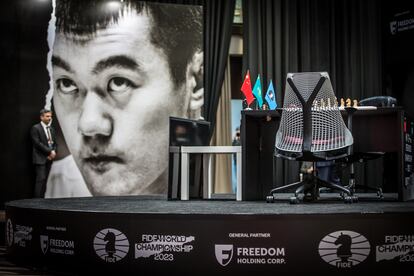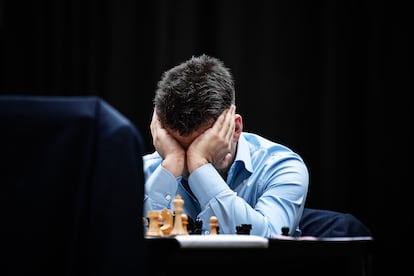Enigmatic moves, empty tables: Ding loses game two of World Chess Championship in bizarre way
The Chinese grandmaster, ranked number three, made a play never seen in elite competition against Ian Nepomniachtchi to hand the Russian the edge in Astana

Almost none of chess’ elite players are particularly strange people, even if the cliché suggests otherwise. But world number three Ding Liren has fed that perception during the ongoing World Championship he is contesting against Ian Nepomniachtchi, the world number two, in Astana, the capital of Kazakhstan, where on Monday he lost the second game of the scheduled 14 after the first ended in a draw. And he did so in a particularly strange way. And not only because of his moves (his fourth was unprecedented on such a stage). Ding spent more time in the locker room than at the table (even when it was his turn to play) dressed in an overcoat with the door to the street standing open. After Tuesday’s rest day, Nepomniachtchi will have the advantage of playing with the white pieces in game three on Wednesday.
Ding has never attracted attention for erratic behavior — his innate shyness runs completely in counter to such scrutiny — and has always distinguished himself by being friendly and approachable. But over the last few days in Kazakhstan he has done several things that, when combined, point to a sense of emotional instability. As a general rule, World Championship finalists are extraordinarily sparing and elusive in front of journalists, because they are afraid of giving away valuable information to their opponent. However, Ding revealed to EL PAÍS the day before the tournament began that he had separated from his girlfriend, to which he attributed his poor results during the pandemic after a spectacular 2019, when he was the opponent most feared by world number one and reigning champion Magnus Carlsen.
But there was more to come over the next 48 hours. On Sunday, after committing a mistake unworthy of his talent in the opening game, although he eventually forced a draw due to his opponent’s imprecision, Ding admitted that he had been depressed during the match, adding that he had changed his accommodation because the official tournament hotel, the Saint Regis, where the match was held, seemed “too luxurious,” and that he had asked his parents to travel from China to be with him.
Stranger things were yet to unfold in game two. Ding arrived 25 minutes early, his white coat folded across his arm, to settle in the heated locker room. But the coat made sense when it became known that the Chinese grandmaster considers it unhygienic to close the door, which opens onto the street where the temperature was a brisk 53ºF (12ºC).

And then Ding did something that nobody could fathom: the Chinese player’s fourth move has never before been used in elite competition, according to databases consisting of more than 10 million games played from the 16th century until Monday. Nepomniachtchi was left looking everywhere but at the board, trying to summon to mind similar positions while attempting to second-guess what on earth his opponent was trying to do with an apparently useless move.
After Nepomniachtchi’s 11th move, Ding sprung another surprise by spending 27 minutes in the locker room. The situation was so bizarre, with the stage devoid of players while an audience of millions followed the live broadcast of the contest online, that the chief arbiter, Serbia’s Nebolsa Báralic, went to see if anything was wrong. Ding later explained that he had become so accustomed to playing in online tournaments during the pandemic that he is now more comfortable considering his position on a monitor than on the table.
It swiftly became apparent that the problem was in Ding’s head. His curious laboratory preparation led him into a position of diabolical difficulty, where the Russian is at his most comfortable. The Chinese player’s mistake was not long in coming and, as Nepomniachtchi himself later acknowledged: “From there the game won itself.”
Two meters away from his opponent, Ding was so crushed that it was awkward to ask him questions. “I didn’t see anything during the game,” he managed to respond, referring to key moves. “It’s very hard to play like this,” he added.
Sign up for our weekly newsletter to get more English-language news coverage from EL PAÍS USA Edition
Tu suscripción se está usando en otro dispositivo
¿Quieres añadir otro usuario a tu suscripción?
Si continúas leyendo en este dispositivo, no se podrá leer en el otro.
FlechaTu suscripción se está usando en otro dispositivo y solo puedes acceder a EL PAÍS desde un dispositivo a la vez.
Si quieres compartir tu cuenta, cambia tu suscripción a la modalidad Premium, así podrás añadir otro usuario. Cada uno accederá con su propia cuenta de email, lo que os permitirá personalizar vuestra experiencia en EL PAÍS.
¿Tienes una suscripción de empresa? Accede aquí para contratar más cuentas.
En el caso de no saber quién está usando tu cuenta, te recomendamos cambiar tu contraseña aquí.
Si decides continuar compartiendo tu cuenta, este mensaje se mostrará en tu dispositivo y en el de la otra persona que está usando tu cuenta de forma indefinida, afectando a tu experiencia de lectura. Puedes consultar aquí los términos y condiciones de la suscripción digital.









































